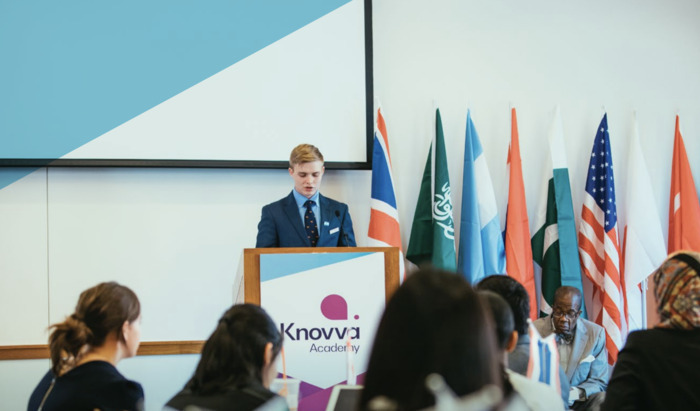7 Tips for College Planning in Junior (or Sophomore) Year
Written by Knovva Academy

So you’ve got the high school thing down. You’re taking classes you enjoy, you participate in stellar organizations and clubs, and you’ve got some great friends. All that college planning stuff? It can wait until next summer, right? Right?!
Well, no, not really. Beginning your college planning process in 11th grade is essential if you want to be ready for that senior year mayhem that is the college admissions process. It is wise to start even earlier than 11th grade (ahem, looking at you, 10th graders). Use the following tips to confidently stride into your senior year knowing that you’ve got this college planning process in the bag.

7 Tips to Master The College Planning Process
Tip #1: Review your course schedule and goals.
At the beginning of the school year, whether you are a sophomore or junior, take some time to reflect on your interests and accomplishments, and review your course schedule. Your academic classes should be rigorous and help you achieve your goals. Consider: which classes will showcase your intellectual ability and challenge you simultaneously? College admissions panels look for students who take the most challenging courses offered at their school and do well in them. Take this into consideration when you’re choosing courses. If you are in 10th grade, you can plan which Advanced Placement (AP) courses to take in your 11th grade year.
Taking AP classes will show your determination and academic commitment, particularly if you excel in them. However, if your school offers limited or no AP courses, you should still search for classes that showcase your motivation and intellectual curiosity.
Next, consider your extracurricular activities. Which interests will you continue pursuing? How can you stand out in those pursuits? Think big! Enroll in a competition, like an essay contest. Create a prototype for an invention. Solve a community issue by getting the entire community to participate in the solution. Remember, most applicants to selective schools meet the academic requirements, so you want to stand out from the crowd with these extras.
If you are unsure where to start, discuss your course choices and extracurriculars with a college counselor, parent, or trusted teacher.

Tip #2: Begin Your College Search Early
You may think you already know which school you want to attend. Maybe, you already own a sweatshirt. That’s all well and good, but you may be missing out on a college that has the academics, extracurriculars, and career-ready internships that your first choice has to offer, but at a fraction of the cost. You want to craft a balanced list of schools to apply to, so consider applying to a couple of schools in each of the following categories:
- Reach schools: the ones that are really hard to get into, but you think you still have a chance.
- Match schools: a little less difficult to get into, but still challenging and well-suited to you
- Likely schools: sometimes called ‘safety schools,’ these are the ones that have high admittance rates that you are very likely to get into.

How do you create this list? Start with what is important to you. And it’s okay if you don’t know what is important to you… yet. Knovva Academy is here to help. Let’s look at the following college planning factors to get you started:
- Location: Consider the location of the university. Do you see yourself taking a subway filled with people to a world-class museum on a Sunday afternoon? Or do you imagine vast fields of grass with low-lying buildings and only a few other students within eyesight? Other factors to consider here are things like: will you need a car to get around the area? What is the climate? How diverse is the area? Make a note of these factors as you begin your search. Although you may not yet have an idea of your preferences, these will come into focus further along in your research.
- College Size: Do you want to know the names of everyone in your class? Or do you enjoy having everyone listen to your excellent ideas in a large lecture hall? How you answer these questions can clue you into what size college may be good for you. Note that academic program size may vary as well, which will have a bearing on your class size and interaction with fellow students and faculty.
- Small colleges are those that have fewer than 5,000 undergraduate students.
- Medium-sized colleges typically have between 5,000 and 15,000 students.
- Large colleges or universities have more than 15,000 students.
- Academic Programs: If you already know what you want to major in, confirm that the schools you are interested in offer that specific major. If you are unsure of your future area of study, review the academic majors listed on the university’s website. To narrow down your list, cross off the unappealing majors and see what is left.. Are there a wide variety of majors, or are they limited and specialized? Which is important to you?

- Work-Study and Job Opportunities: If you plan to work during college, you will need to research what types of opportunities are available to you. Federal Work-Study is a college program that allows you to have a part-time job while attending classes. If this is a priority, make sure you meet the requirements to participate in such a program. In the United States, international students are ineligible to participate in the Federal Work-Study program. However, countries like Canada and the United Kingdom allow international students to have part-time jobs while pursuing their degrees.
- Student Housing: What housing is available? There may be dormitories, off-campus housing, cooperative housing, or residence halls. Often, universities require that students live on campus during their first year. Check to see if housing is available all four years, or if you’ll be expected to move off-campus at some point.
- Extracurricular Activities and Athletics: Make a note of whether the universities have extracurricular activities or athletics that interest you. These activities will be where you meet friends, build up your resume, make connections to get a job, or even discover a new calling. If you’re an athlete, check to see which division of sports the teams play in. Ask about club sports and intramurals.
- Student Life: Extracurricular activities dovetail nicely with student life. Is there a tight-knit camaraderie amongst students? Do students study in groups or individually? Do faculty and students often interact outside of class? If you can, going on tours of a college’s campus can provide perspective on what it’s like to be a student on campus. If that’s not an option, check their website to see if they offer a virtual tour.

While you can find most of this information online, attending an in-person or virtual tour will provide you with a more in-depth perspective of a college. Check out NACAC’s Virtual College Fairs to learn more about a university without leaving your home.
Tip # 3: Make summer plans.
To become the most competitive (i.e., appealing, distinctive, and brilliant) applicant we know you are, you should consider leveling up your summer plans. Decide on your focus. Do you want to continue to pursue a passion of yours? Or do you want to strengthen your skills in another area?
Research which programs, internships, camps, competitions, or job opportunities are available to you. Many summer leadership programs are selective and require that you complete an essay along with an application. If an in-person program is not an option for you, consider remote learning. Many universities offer online courses that you can take from the comfort of your living room.

Tip #4: Create a resume.
You may be thinking, “What?! I’m not looking for a JOB, and I don’t even have experience!” Well, the first part might be accurate, but you have more experience than you think. A resume will help you organize your activities, classes, and accomplishments into one easy-to-read document.
Have you ever participated in community service? Maybe you’ve been part of a leadership club for the past four years. Or perhaps you’ve spent your summers working at a local shop. Add all of these unique experiences to your resume.

Tip #5: Prepare for standardized testing.
Whether it is the ACT, SAT, or TOEFL, studying for any upcoming standardized testing is essential. You can find many free study-aids with an internet search. While many colleges have become test-optional during the pandemic, having a strong SAT or ACT score can improve your overall application, or provide you with scholarship opportunities. Plan to take them as part of the college planning process; if your score is good, include it in your application.
Tip #6: Review Common Application and other personal essay prompts.
We imagine that you will need to write at least one personal essay for your college applications. In actuality, it is far more likely that you will write about fifteen to twenty essays, including supplemental essays.
Familiarize yourself with the 2024-25 Common App essay prompts. Begin making a mental list of how you would answer each question. Now write that list down and continue compiling ideas over the next few months, so you have a lot to choose from when you begin your essay.

Tip #7: Identify possible recommendations.
The last thing your teacher, boss, or coach wants is to get a frantic email requesting a letter of recommendation one day before your college application is due. It’s not that they don’t want to tell the admissions panel what a stellar human being you are, but you didn’t give them enough time to craft a compelling letter that adequately describes your great attributes. So begin thinking about who you can approach for a letter of recommendation early on in the process.
Being purposeful about developing a good relationship with teachers, coaches, or supervisors is necessary before approaching any of them for a letter of recommendation. If they have a good relationship with you, they will know and appreciate your effort in your work and can speak to that effort in your letter of recommendation. Make a list of possible people to approach. And if you are unsure of who to approach, start making those connections now.
So there you have it; seven tips to put into practice before your senior year of high school. Keep in mind that this list is by no means exhaustive. The college planning process can be, quite honestly, intense. However, by beginning early, tracking your progress, and remembering your end goal (getting into college!), we know that you’ll end up in the right place for you. And if you need any assistance getting there, we’ve got some great plans for you.